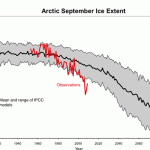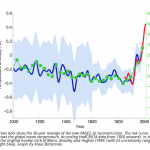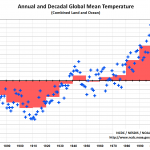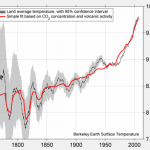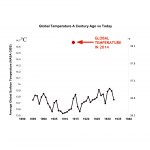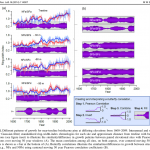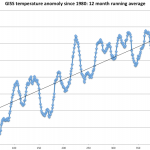global warming
Arctic sea ice decline happened faster than expected. This has the effect of accelerating global warming because less of the Sun's energy is reflected back into space by ice.
Northern Hemisphere snow also sends some of that energy back into space. The amount of snow cover we have is also declining.
Difference from average annual snow extent since 1971, compared to the 1966-2010 average (dashed line). Snow extents have largely been below-average since the late1980s. Graph adapted from Figure 1.1 (h) in the 2012 BAMS State of the Climate report.
The warming of the Arctic region is also…
Andrew Revkin has this commentary at the New York Times: How ‘Warmest Ever’ Headlines and Debates Can Obscure What Matters About Climate Change.
I will argue below that Revkin has, inadvertently or not, linked a science denialist trope to the important scientific finding that 2014 is the warmest year on record, as part of his presumably well intentioned effort to focus on trends rather than individual points. (See his comment on this blog below.) Yes, the trend is more important than a given data point, but the headline does not really obscure, but rather, underscores.
I'm afraid the…
What is the Serengeti Strategy?
"The Serengeti Strategy" is a term coined by climate scientist Michael Mann in which "special interests faced with adverse scientific evidence ... target individual scientists rather than take on an entire scientific field at once." His invention of the analogy must have been an interesting moment, given the context. In his book, The Hockey Stick and the Climate Wars: Dispatches from the Front Line, Mann talks about a trip to scientific meetings in Arusha as an IPCC co-author, during which he took the usual side trip to the Serengeti:
After the meeting, I…
The title of this post is the beginning of a more extensive comment, as follows:
Few things threaten America’s future prosperity more than climate change.
But there is growing hope. Every 2.5 minutes of every single day, the U.S. solar industry is helping to fight this battle by flipping the switch on another completed solar project.
According to GTM Research and the Solar Energy Industries Association (SEIA), the United States installed an estimated 7.4 gigawatts (GW) of solar last year — a 42 percent increase over 2013 — making it the best year ever for solar installations in America. What’…
Matt Ridley has written an opinion piece for The Times (not the New York Times, the other one) which is a response to his critics, specifically, to those who openly disagree with him about climate change. Ridley’s commentary is jaw dropping, and for most of you, those who are not of Royal Blood and highly privileged, it is more than a little squirm-inducing. But, putting that aside, Ridley makes a number of assertions, two of which (*) I’d like to address. Other problems with Ridley's approach have been addressed here, by Dana Nuccitelli.
Spoiler alert, he is wrong on both counts.
First, to…
The New York Times put the news of 2014 being the warmest year on their front page, in the precious space known as "Above The Fold." But, the venerable paper of record continues to give credence to science denialists by calling them "skeptics," and continues to imply that there really is a debate between consensus based science and politically motivated denial of science. To underscore this point I created the above graphic.
I would also like to congratulate the Washington Post for putting this piece by Joby Warrick and Chris Mooney on the front of section A1.
And, TIME has also placed…
NOAA will announce today that 2014 was the warmest year during the instrumental record, which begins in 1880. The announcement, which addresses findings of both NOAA and NASA, will be made today at 11:00 Eastern. Below is the press release from NOAA.
I talked about this and other climate matters in a radio interview at Green Divas:
Michael Mann has made the following statements regarding this news:
2014 Was Earth’s Warmest Year On Record
Three major climate organizations (JMA, NASA, and NOAA) have now released their official estimates for the 2014 Global Mean Surface Temperature. Both JMA…
I just did an interview on Green Diva Radio, and talked about a lot of climate change science news. For those who want to see the sources, here is a quick summary:
On Friday, NASA and NOAA are expected to announce that 2014 was the hottest year on record. I had been planning to write an extensive blog post going into all sorts of details about how that works, how they calculate it, etc. But then the people at Climate Nexus wrote a post that would have blown mine out of the water with the detail and informtation provided in it. Go here to read this excellent post: 2014: Putting The Hottest…
This is serious. A highly regarded and widely recognized planetery physicist put together the most dangerous scientific ingredients that exist: skepticism of the established science, a comprehensive list of hypotheses that stood in opposition to that established science, a huge amount of data, a healthy amount of funding including a good chunk from energy companies that mainly sell fossil carbon based fuels, and a hand selected research team of others who were also skeptics.
In the end, he came up with an explanation for what people call Global Warming. Personally, I believe him. I think…
I did an interview on Green Diva, which you can tune into and enjoy HERE or here:
My part starts just after 30:40 into the show, but do feel free to listen to the whole thing!
With what may be the warmest year in centuries about to close, I thought it would be fun to have a graphic comparing the march of global average temperature over several years about a century ago with the present state of affairs. This graphic is based on NASA's data, using John Abraham's estimate for the 2014 temperature (it might end up being a tiny bit different). There is more information about those sources here.
[click on the graphic to get to a larger version]
Just to be clear on how to read the graph ... the red dot is not anywhere in particular on the horizontal scale. The X and…
Enough! That's Peter Doran's opinion on the "debate" about a scientific consensus on climate change. There clearly is one -- a strong one. So why do the public and the politicians think otherwise? Why the big disconnect between what the vast majority of scientists know to be fact, and what the public thinks. Dr. Doran blames the way media reports on science, and he blames a few of the loud voices on the right. He presents an idea to change a lot of the minds of people who deny the scientific consensus on climate change which will hopefully lead politicians to action. Peter Doran is a…
A new study has recently been published that looks at the ecology of bristlecone pine growth at Sheep Mountain, and the tree ring signal those trees produce, at high altitudes in the Southwestern US. This is important because tree rings are an often used proxyindicator for reconstructing past climates. Those who keep track of the paleoclimate research will recall, for example, that tree rings were one of the proxyindicators used by Michael Mann and his team in constructing the famous "Hockey Stick" graph showing a dramatic increase in the Earth's temperature since the onset of industrial…
In early December I wrote a post called "2014 will not be the warmest year on record, but global warming is still real." The very first thing I said in that post is that I was going out on a limb. I also discussed whether or not one year mattered, and I discussed the nature of the phrase "X is the Yth warmest year on record," going into details on what "the record" is and how we measure this.
I want to reiterate something very important that I mentioned then. Here, we are talking about a combination of measurements from the sea surface and the air just over the land (about where your head…
Matt Ridley is a British journalist whom some in the science community are now quietly referring to as an “anti-science writer.” He has taken up the cause of denying the widely held and deep scientific consensus on climate change. He has a recent blog post he seems to have been compelled to write in response to a new study on the use of tree rings as a proxyindicator for past temperatures. I’ll be writing about that research in a day or two. Ridley’s post is embarrassing, and especially annoying to me because for several years I used his book on evolutionary biology as a recommended (or…
I'm going out on a limb here. 2014 has been a very warm year. We've had a number of record setting months. But, a couple of months were also coolish, and November was one of them. December started out cool (like November ended) globally, but actually over the last few days the global average temperature has been going up. But, unless December gets really warm really fast, is is probably true that we will break some records but not all. This entire discussion, however, is problematic for a number of reasons.
How much does one year matter?
How warm or cold a given year is does not matter…
Check out this new paper in the RNCSE, by John Abraham, John Fasullo, and Me.
